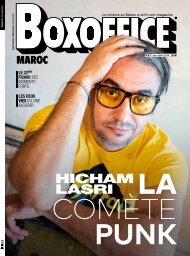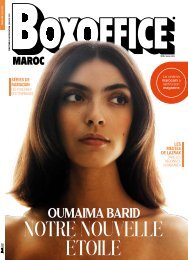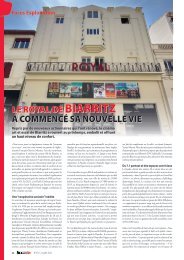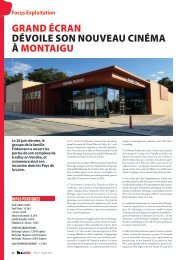Create successful ePaper yourself
Turn your PDF publications into a flip-book with our unique Google optimized e-Paper software.
Indonesia and Germany<br />
Seen As Big Market<br />
NEW YORK—Indonesia and Germany are<br />
certain to join Italy as among the most profitable<br />
U.S. film markets<br />
in the world, according<br />
to Samuel N.<br />
Burger, sales manager<br />
of Loew's International.<br />
He returned<br />
recently from a nineweek<br />
tour of 20 countries<br />
that took him 40,-<br />
000 miles. He did not<br />
visit South America,<br />
South Africa or Australia.<br />
Burger was enthusiastic<br />
about Indonesia,<br />
Samuel N. Burger<br />
saying that now the country has independence<br />
it offers a fine market, that local capital is<br />
building theatres and that Loew's is looking<br />
forward to operation of its own sales there<br />
after the first of the year, when the Motion<br />
Picture Export A.ss'n will become only a service<br />
organization handling physical distribution<br />
and storage. Edward O'Connor is in<br />
charge and hiring native employes. Other<br />
companies are doing the same.<br />
FIFTEEN FILMS TO GERMANY<br />
Burger checked on the establi-shment of<br />
the home office in Germany at Frankfort,<br />
and branches set up at Dusseldorf, Hamburg,<br />
Munich and Berlin, in the expectation that<br />
the German market will become "one of the<br />
most important" in Europe. Present Loew's<br />
plans call for export of 15 films to Germany.<br />
Quite a few prewar exhibitors have returned<br />
there. Burger said.<br />
Italy, he predicted, will be the biggest European<br />
market, "as always." The Italians<br />
are very friendly to Americans, and the overall<br />
gross of all U.S. films has risen .steadily<br />
each year since the war. Burger spoke in high<br />
terms of Loew's new synchronizing plant in<br />
Rome, established by Arthur Loew, calling it<br />
the finest equipped studio of its kind in the<br />
world. Its modern American equipment does<br />
dubbing for the films of many producers. At<br />
the present time two and a half shifts are<br />
working daily. In charge is Arthur Field,<br />
former Hollywood production man, who represents<br />
Loew's throughout Europe.<br />
TO BUILD IN ISRAEL<br />
In Israel, Loew's plans to build theatres<br />
in Tel Aviv, Haifa and Jerusalem if and when<br />
suitable sites can be obtained. One new<br />
theatre and one renovated theatre have just<br />
opened at Haifa and two are under construction<br />
at Tel Aviv, all with local sponsorship.<br />
Loew's will finish construction in May 1950,<br />
of its theatre at Alexandria, which will be as<br />
fine as any in the world, but does not now<br />
plan any other building abroad.<br />
Regarding the overall foreign business picture.<br />
Burger said that general economic conditions<br />
are "perking up" in all Europe because<br />
of the Marshall Plan, and that there<br />
is no question but that U.S. films dominate<br />
more than ever before.<br />
"Outbreak" is the new title of the 20th-<br />
Pox picture formerly called "Port of Entry."<br />
DuMont Predicts Sales<br />
Of 80 Million in '50<br />
WASHINGTON— Sales by DuMont Laboratories,<br />
television manufacturing company,<br />
should total $45,000,000 this year and may<br />
reach $80,000,000 in 1950. Dr. Allen B. Du-<br />
Mont, president and founder, told the investment<br />
subcommittee of the House-Senate economic<br />
committee December 12. He said sales<br />
are currently at the rate of about $70,000,000<br />
a year. In 1946 they amounted to $26,859,049.<br />
DuMont predicted 1949 profits of more than<br />
$3,000,000. Earnings in 1948 were $2,701,767,<br />
equal to $1.29 a common share. Total company<br />
assets reached $22,376,000 as of November<br />
6, compared with total assets of $12,-<br />
169,275 as of Jan. 2, 1949. He said there will<br />
have to be expansion in about a year, and<br />
that he hoped it could be financed out of<br />
profits. The company was formed in 1931<br />
with a capital of $1,000 and its sales that<br />
year amounted to only $70. In 1938 the company<br />
first began selling stock on the market<br />
to get equity capital.<br />
DuMont again attacked color television as<br />
not being sufficiently advanced for pre.sentat:on<br />
to the public. If peimitted now, he said,<br />
it might have to be "thrown out" in a few<br />
years and a new start made.<br />
U.S. Investment Co.<br />
May Lend to British<br />
NEW YORK — The American<br />
investment<br />
house of Schroder Rockefeller & Co. is considering<br />
financial support of future J. Arthur<br />
Rank and Sir Alexander Korda productions<br />
in Britain and on the European continent.<br />
Negotiations have been proceeding since late<br />
in the summer when Mord Bogie, president,<br />
met in London with the British film men.<br />
Avery Rockefeller, grandson of John D. Rockefeller<br />
jr., is a member of the firm. It would<br />
be its first entry into film financing.<br />
All would be Technicolor films, according<br />
to Kay Harrison, head of British Technicolor,<br />
and they would possibly number six. Harrison<br />
is now here after introducing Bogie to<br />
Rank and Korda in London. He .said interiors<br />
and laboratory work would be done in<br />
London, and forecast important financing<br />
deals in the near future.<br />
Philip W. Moore, assistant to Bogie, confirmed<br />
that conversations have been held<br />
with Rank and Korda, but said no estimate<br />
is possible as to when, if ever, they might<br />
result in an agreement on financing, and that<br />
nothing is definite about the amount the<br />
company would invest.<br />
Harrison said it is tentatively planned to<br />
use Hollywood stars, directors and writers.<br />
He thought there will have to be changes in<br />
the current system of financing before a deal<br />
can be agreed upon. He said British Technicolor<br />
business this year has exceeded that of<br />
1948 by 50 per cent, and that things are looking<br />
even better for 1950.<br />
'B' Pool to Produce<br />
Second Half Million<br />
NEW YORK—The Bank of England has<br />
approved a second payment of $500,000 to<br />
U.S. distributors out of the controversial "B"<br />
pool, so that the yield of the pool during its<br />
first year of operation will be $1,000,000. The<br />
two payments are for money due imder the<br />
Anglo-American film agreement for the period<br />
of June 1948-June 1949.<br />
Under the agreement, the "B" pool represents<br />
the earnings of British films in this<br />
country and that is added to the "A" pool,<br />
which comprises the top earnings of $17,000,-<br />
000 in Britain that American distributors are<br />
permitted to take out in dollars each year.<br />
It was intended that the total amount would<br />
then be divided among the distributors in relation<br />
to the amount of business each did in<br />
Britain during the year. That would mean<br />
$18,000,000 for the distributors for the year.<br />
However, the "B" pool has not worked out<br />
well in practice. When some American distributors<br />
and British producers arrived at<br />
special deals, no money was forthcoming<br />
for the pool. Universal-International, which<br />
had earnings from J. Arthur Rank films, objected<br />
that it was contributing the major<br />
part of the income of the pool, and it has<br />
now refused to recognize the pool any longer.<br />
MPAA-member companies have insisted<br />
that U-I should stay in the pool. The dispute<br />
was gone over by company presidents<br />
recently and referred to their legal departments<br />
for recommendations. A protest may<br />
be made to the British government. At any<br />
rate, the matter is sure to come up at the<br />
next Anglo-American meeting in London early<br />
in the year.<br />
Electronic Color System<br />
For TV Is Developed<br />
TROY—An all-electronic color television<br />
.system, said to embody new principles<br />
throughout, has been developed by two<br />
scientists of Rensselaer In.stitute. Dr. Victor<br />
A. Babits and H. Frank Hicks jr.. both members<br />
of the electrical engineering department.<br />
The system, still in the laboratory stage,<br />
can also be used in the motion picture field,<br />
it was said. Colored films can be taken with<br />
black and white film by using the color control<br />
device on the camera and on the projector.<br />
For television, the system achieves<br />
color control with either an electric or magnetic<br />
field using a single camera tube at the<br />
studio and a single picture tube in the home<br />
receiver.<br />
Pakistan Moslems Angry<br />
About 20th-Fox Film<br />
KARACHI—Moslem religious leaders in<br />
Pakistan have expressed indignation over<br />
"Everybody Does It," 20th Century-Fox film<br />
burlesque on opera, viewing it as based on<br />
the life of the holy daughter of the Prophet<br />
Mahomet. They registered a complaint with<br />
Hooker A. Doolittle, American charge d'affaires,<br />
that it is "outrageous" and "inunoral."<br />
(Twentieth-Fox said it is amazed at the<br />
reaction, and that there was no intention of<br />
offending anyone, i<br />
46 BOXOFFICE December 24, 1949

















